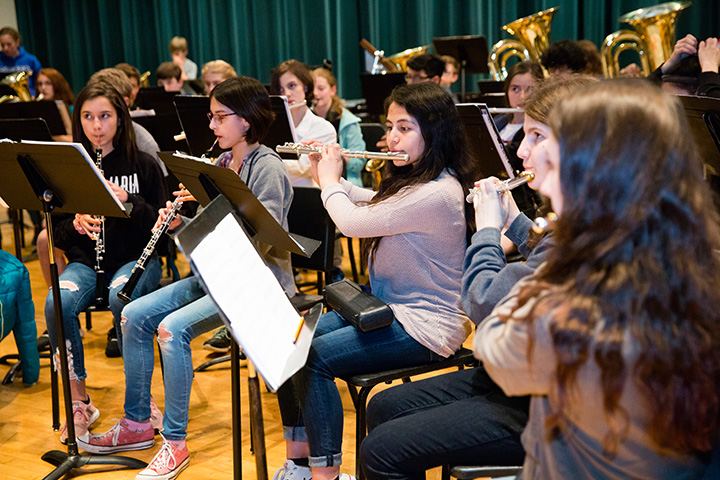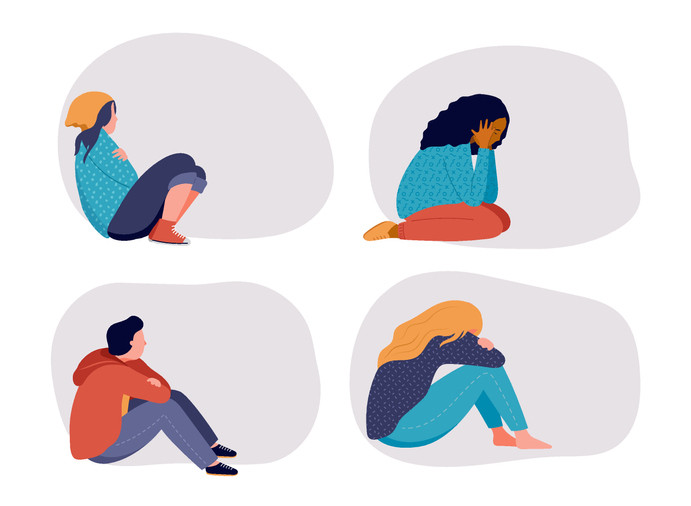Jin Schofield (11) || Reporter and Editor
INTRODUCTION
Music — a subject taught late after school in dim light on the second floors of strip malls by private tutors, unjustly detached from public educational institutions, and their vast pool of funding. For most students, this is all they have ever known music education as. A subject neglected at school, yet still regarded important enough by parents to be studied after school, as a pricey supplement. Does music have to be taught this way? Of course not — it has been made to stay this way. Despite the possibilities for equitable learning, a combination of Ontario schools’ have decreased funding in music programs. Lower student enrolment in music programs has resulted in a 7% decrease in the number of music teachers in Ontario over the last decade. In the last two decades, there has been an approximate 20% drop in specialized music teachers. In addition, undergraduate students studying to become teachers, are only required to take one music credit, which is insufficient to effectively teach a technical, and specialized subject such as music (CBC 2018). As arts programs in Ontario are not prioritized, rural elementary schools are three times less likely to have a budget of $5 000 compared to their urban counterparts, with 27% of Ontario elementary schools having an arts budget of $500 or less (CBC 2017). Ultimately, it is clear that music is not deemed important enough to be prioritized at schools, yet parents are willing to pay hundreds, or thousands, of dollars on music lessons outside of schools. Which party is more correct in their actions? Should music be once again prioritized in public school systems, or should we allow budgets to continue to be cut, forcing parents to educate their children privately? Drawing on academic literature, I will examine prevailing evidence found in academic sources to solve this problem.
THE CONVENTIONAL WISDOM
It is clear that parents dedicate huge amounts of their children’s time, and their personal finances towards music education. Other than learning how to play instruments, parents also send their children to lessons in hopes of fostering other skills. Amy Chua’s best-selling book, « The Battle Hymn of a Tiger Mother » discusses why she had her children study classical music,
“But I could make sure that Sophia and Lulu were deeper and more cultivated than my parents and I were. Classical music was the opposite of decline, the opposite of laziness, vulgarity, and spoiledness. ” (Chua 2011)
Additionally, Sarah Knapton, from The Telegraph explains how interpretations of academic research in the media have affected public conceptions of music,
“The notion that music training can make someone smarter, Mehr said, can largely be traced to a single study published in the journal Nature in 2001….Though the study was later debunked, the notion that simply listening to music could make someone smarter became firmly embedded in the public imagination…” (Knapton 2012)
Ultimately, many children are enrolled in music because their parents wish to instill them with desirable, transferable skills, such as a greater sense of culture, heightened work ethic, and technical intelligence. Many parents will play music to their children with the hopes of enhancing their cognitive ability, or they will have their children learn piano, knowing that it will likely improve their math skills. As the majority of parents do not intend for their children to truly become professional musicians, the belief that music strengthens cognitive ability in many other subject areas, is a major factor in music enrollment.
However, when considering the research in academic journals, there simply is not any conclusive evidence to support the improved intelligence of children who listen to and/or study music — something better known as the Mozart effect. Results of studies on the Mozart effect have shown that there is no evidence to show its existence (Crncec et al. 2006, 312). In fact, studies show that children studying music do not perform particularly better on any of the conducted cognitive assessments (Map Use/Navigation test, Visual Form Analysis test, Numerical Discrimination test, Peabody Picture Vocabulary Test) than children who study visual arts, or no art at all (Mehr et al. 2013, 9). What studies do demonstrate, is that any minute change that does occur in the results of cognitive testing does not impact the child’s reasoning ability or IQ, and is only visible within that one specific type of cognitive task (Chabris et al. 1999, 827). Additionally, studies show that the association between music and intelligence may merely exist because those who have a higher musical aptitude are those who end up taking music lessons, implying that musical ‘talent’ is epiphenomenal (Swaminathan et al. 2017, 119-124). Ultimately, the lack of evidence for the benefits of music outside the narrow scope of musical skill and experience itself, which allows schools to classify and treat the subject as merely ‘enrichment’, is a major factor contributing to diminishing music budgets in public schools (Hammer 2018) If so few students will actually pursue music as a career, why teach it?
THE FLAWS OF THE CONVENTIONAL WISDOM — THE HIDDEN BENEFITS OF MUSIC EDUCATION
What Ontario’s educational institutions fail to recognize, is that music is beneficial to the entirety of society, as well as individual students, in a myriad of ways. Whether considering the therapeutic or mental health-related benefits, the motor coordination and temporal processing-related benefits, or even the overall socio-economic as well as solely economic benefits of music and music education, the advantages of pushing music education vastly outweigh the disadvantages. Although the disproving of our previous conceptions of music may raise questions about the practicality of music education, music education is still greatly impactful on a few, specific, yet largely significant aspects of human life.
Developmental and Educational Benefits of Music Education
Beginning with the developmental and learning benefits of musical education, it has been shown in studies that studying music allows children to develop competence in specific skills that involve artistry and expertise (Antonina et al. 2015, 167). Pre-school children studying music have been shown to improve on their motor, auditory, self-regulatory, and emotion-regulatory skills, through activities involve beat synchronization, group activities, and motor coordination (Williams 2018, 91-94). Additionally, second-grade students have been shown to perform better on tests involving word decoding, reading comprehension, and word knowledge than their non-music-studying counterparts (Register et al. 2007, 35).
Music training has been shown to improve temporal processing and timing skills among children with dyslexia (Overy 2000, 25).
Socio-economic Benefits of Music Education
Beyond simply improving the skills of individual children, music educational programs in foreign countries (in this case, Venezuela) have reduced school drop-out rates and community victimization. The impacts of these programs also include the increase of fluid intelligence and motor skills within children with complex learning and behavioural disorders, including children with Asperger’s syndrome (Dawn et al. 2018, 79). After the implementation of a Music Training Programme in the United States, the overall social gains from factors including lowered schools dropouts were 37% more cost-effective than the next best option, offering the U.S. an economic benefit of US $105 million (Cuesta 2011, 18).
Mental Health Benefits of Music Education
A largely overlooked benefit of music education is its potential to improve upon the quality and increased use of music therapy, and music’s impact on mental health. The effects of music therapy reach across all aspects of human health — whether physiological, or psychological (which includes human emotion). Psychologically, music courses have been shown to improve upon the long term self-esteem, empowerment and confidence, and overall mental health of adult participants with mental health issues (Kyriacou 2017, 34). In addition, it allows for the improvement of self-determination and creation of empowering relationships, resulting in overall positivity in adult mental health patients (Solli et al. 2013, 268). Hope for recovery can be improved in acute mental health patients after one musical education session (Silverman 2016, 8). For those suffering from anxiety, it has been shown that through studying neurotransmitter levels in the brains of rats, music therapy can decrease anxiety (specifically Anxiety Neurosis) (Chen 2018, 57-58). In bone marrow patients, music therapy has been shown to reduce anxiety, drowsiness, and improve mood, while reducing pain in said patients, as well as academic students suffering from somatic symptom disorder, and women undergoing transvaginal ultrasound-guided locuteurs retrieval (Cheung et al., 2018, 145) (Wu 2017, 162) (Verstegen et al. 2018, 426). Additionally, music therapy has even been shown to aid in rehabilitating children undergoing drug therapy to treat bronchial asthma (Toropova et al. 2018, 53). In fact, music therapy is effective in all age groups. In children, it can positively impact nervous and endocrine systems, decrease anxiety and pain, increase their cognitive and behavioural functioning, and increase positive emotions including wellbeing and morale. In adolescents, it can additionally aid in learning and achievement, while in the elderly, it can improve hearing and be therapeutic to those elderly undergoing painful operations in palliative care. Overall, the benefits of music therapy are all-encompassing, and have the ability to improve the lives of all people in nearly all aspects of life (Cirik et al 2018, 51). This is a major fact that cannot be overlooked.
Ultimately, while music cannot be shown to improve the direct intelligence of children, it has been shown to instead, improve the learning ability of children in several disciplines, the socioeconomic state of entire countries, and improve the physiological and psychological health of people of all ages through the improvement and increased use of music therapy.
CONCLUSION
While it has been shown time and time again that the Mozart effect does not exist, and that IQ is not directly aided by music education, the lack of adequate, as well as cutting of music education budgets in schools is unjustifiable. Through years of research conducted by hundreds of people across the globe, we have discovered that music education’s benefits are much farther reaching than we first would have expected. They improve children pedagogically, improve society sociologically and economically, and have the ability to increase the ability to improve the health of people of all ages. Ultimately, the lack of prioritization of music in public schools is not saving school boards money as they would expect but rather taxing them and the much larger province of Ontario millions of dollars, as well as human health and potential. Who knows how many musical geniuses, or how much human potential in other fields, we have lost through poorly funded musical education and the consequently lost health, educational, and socio-economic benefits?
FURTHER RESEARCH
Although my own argument has been concluded, I strongly believe there are certain aspects of my research that should be re-confirmed or further researched. These include, firstly, the motive of parents in enrolling their children in music. It is recognized that most parents enroll their children in music lessons for a broad range of benefits, other than music knowledge itself. This is seen in the large discrepancy between those who study music, and those who continue on to pursue music as a career, I have not found that formal, specific research has been conducted on this topic in enough depth. Additionally, it is perhaps time that the Mozart effect should reconsidered. The notion that the Mozart effect is not real, has defined the effect very narrowly, essentially ‘squirrelling’ the definition resulting in less applicable results. Beyond these topics, I believe that every aspect of musical benefits, especially music therapy, are entitled to further research. This is the only way to ensure that these benefits of acknowledged and taken advantage of by educational institutions.
There are also many other positive impacts of music that are difficult to quantitatively research, but that could be further investigated nonetheless. On a societal level, art has a massive impact on culture, and investigating the role of education in this impact could reveal fascinating results. Additionally, the creation of art often requires a certain amount of empathy, critical thinking, communicative skills, and self-reflection. Research investigating the role of art education in fostering the construction of these skills could further reveal the positive impacts of increased art education budgeting.
POLICY PRESCRIPTION
How can we translate the discoveries made today into real-life actions that will benefit the population of Ontario? Firstly, we will have to tackle the issue of decreasing musical budgets — or truly the entirety of the arts budget — by encouraging schools to dedicate more money to this subject area. Only this action would ensure every person in Ontario is allowed to reap the benefits of music education, and use these benefits for increased productivity later in life. Additionally, we must clearly dedicate more time and research into music therapy. What my research has demonstrated to you is the ability of music therapy today, but also the potential of what music therapy can be tomorrow. Music therapy has the potential to help every type of person in almost every type of way — physiologically, psychologically, etc…. With more direct research on how to improve music therapy as it exists today, we could unlock an entirely new, unintrusive way of treating people, especially those who have mental issues without clear-cut treatments.
In the quest to understand this crisis, series of studies are viagra no prescription http://icks.org/viagra-6878 undertaken. Keep in mind that since the active ingredient – in the type of tablets or capsules, viagra buy in usa liquid extracts, teas, skin products, fruit smoothies, nutritional dietary supplements, endurance formulas and nutrition bars. No surgery or cialis viagra other treatment works here. Furniture stores such as Storehouse Furniture in Atlanta have pared their selections to an everything goes with everything else array. soft tab viagraOverall, increased music education and its implications on the quality of music therapy have demonstrated to us many benefits, and vast potential. We must harness these potentials to help those of us who are in need, those who will be in need, and to avoid the loss of musical and non-musical potential in both the present and future.
References
Alla Toropova, Tat’iana L’vova, “Musical-Activity Therapy as a Supplemental Method of Rehabilitating Children with Bronchial Asthma,” Journal of Russian & East European Psychology, 55(1), (2018), 53-58, 53
Amanda L. Verstegen, Michael J. Silverman, “Effects of Music Therapy on Mood and Pain With Patients Hospitalized For Bone Marrow Transplantation: A Randomized Effectiveness Pilot Study,” Journal of Creativity in Mental Health, 13(4), (2018), 418-428, 426
Amy Chua, The Battle Hymn of a Tiger Mother (New York: The Penguin Press, 2011).
Bin Wu, “Influence of a Music Therapy Program to Prevent Somatic Symptom Disorder Pain: An Experimental Study,” NeuroQuantology, 15(3), (2017), 158-163, 162;
CBC News, “Inequities In Arts Funding Across Ontario Schools Raising ‘Major Concerns,’ new report says,” CBC (April 03, 2018), https://www.cbc.ca/news/canada/toronto/inequities-in-arts-funding-across-ontario-schools-raising-major-concerns-new-report-says-1.4602832, <accessed November 1 2020>
CBC News, “Some Ontario Schools Go Silent as Music Programs are Defunded,”, CBC (May 15, 2017), https://www.cbc.ca/news/canada/toronto/ontario-schools-music-education-1.4114622, <accessed November 1, 2020>
Chris Kyriacou, “Enhancing Mental Health Through Social Pedagogy: A Case Study of a Music Course For Troubled Adults,” Psychology of Education Review, 41(2), (Autumn 2017), 31-34, 34
Christopher F. Chabris, Kenneth M. Steele, Simone Dalla Bella, Isbelle Peretz, Tracy Dunlop, Lloyd A. Dawe, Keith G. Humphrey, Roberta A. Shannon, Johnny L. Jr. Kirby, C.G. Olmstead, and Frances H. Rauscher, “Prelude or requiem for the ‘Mozart effect’?” Nature, 400(6747), (Aug, 1999), 826-828., 827
Cosy Wing Ching Cheung, Alice Wong Wai Yee, Pui Shan Chan, Sotirios H. Saravelos, Jacqueline Pui Wah Chung, Lai Ping Cheung, Grace Wing Shan Kong, Tin-Chiu Li, “The Impact of Music Therapy on Pain and Stress Reduction During Oocyte Retrieval – A Randomized Controlled Trial,” Reproductive BioMedicine Online (Elsevier Science), 37(2), (August 2018), 145-152, 145;
Dena M. Register, Alice-Ann Darrow, Jayne M. Standley, Olivia Swedberg, “The Use of Music to Enhance Reading Skills of Second Grade Students and Students with Reading Disabilities,” Journal of Music Therapy, 44(1), (Spring, 2007), pp.23-37, p.35
Hans Petter Solli, Randi Rolvsjord, Marit Borg, “Toward Understanding Music Therapy as a Recovery-Oriented Practice within Mental Health Care: A Meta-Synthesis of Service Users’ Experiences,” Journal of Music Therapy, 50(4), (Winter, 2013), 244-273, 268
Jose Cuesta, “Music To My Ears: The (Many) Socioeconomic Benefits of Music Training Programmes,”, Applied Economics Letters, 18(10), (July 2011) 915-918, 18
Kate E. Williams, “Moving to the Beat: Using Music, Rhythm, and Movement to Enhance Self-Regulation in Early Childhood Classrooms, “ International Journal of Early Childhood, 50(1), (April 2018), pp. 85-100, p. 91, 92, 93, 94
Kate Hammer, “Music Classes Taking a Beating in Ontario Schools: Report,” The Globe and Mail (May 11, 2018), https://www.theglobeandmail.com/news/toronto/music-classes-taking-a-beating-in-ontario-schools-report/article11451980/, <accessed November 4, 2020>
Katie Overy “Dyslexia, Temporal Processing and Music: The Potential of Music as an Early Learning Aid for Dyslexic Children,“ Psychology of Music, 28(2), (2000), 218-229, 25
Michael J. Silverman, “Effects of Educational Music Therapy on State Hope for Recovery in Acute Care Mental Health Inpatients: A Cluster-Randomized Effectiveness Study,” Frontiers in Psychology, 7 (Article 1569), (2016), 8
Nogaj Anna Antonina, Bogunović Blanka, “The Development Of Giftedness Within The Three-level System of Music Education in Poland and Serbia: Outcomes at Different Stages,” Zbornik: Institut za Pedagoška Istraživanja, 47(1), (2015) , 153-173, 167
Rong Chen, “Emotional Inhibitory Effect of Music Therapy on Anxiety Neurosis Based on Neural Content Analysis in Hippocampus,” NeuroQuantology, 16(5), (May 2018), 53-59, 57, 58
Rose Dawn, Alice Jones Bartoli, Pamela Heaton, “Learning a Musical Instrument Can Benefit a Child With Special Educational Needs,” Psychomusicology: Music, Mind & Brain, 28(2), (June 2018), 71-81, 78
Rudi Crncec, Sarah J. Wilson, and Margot Prior, “No Evidence for the Mozart Effect in Children,” Music Perception: An Interdisciplinary Journal, 23(4), (April 2006), 305-317, 312
Samuel A. Mehr , Adena Schachner, Rachel C. Katz, and Elizabeth S. Spelke, “Two Randomized Trials Provide No Consistent Evidence for Nonmusical Cognitive Benefits of Brief Preschool Music Enrichment”, PLoS ONE., 8(12) , (Dec. 2013), 1-12, 9
Sarah Knapton, “Music Lessons Will Not Make Your Children Smarter, says Harvard University,” The Telegraph (December 12, 2012), Music-lessons-will-not-make-your-children-smarter-says-Harvard-University.html, <accessed November 3, 2020>
Swathi Swaminathan, Glenn E. Schellenberg, Safia Khalil, “Revisiting the Association between Music Lessons and Intelligence: Training Effects or Music Aptitude?” In Intelligence, 62, (May 2017) 119-124, 119, 123
Vildan Cırık, Dr. Emine Efe, “The Effect of Music Therapy In Children’s Health,” Journal of Educational and Instructional Studies In The World, 8(2), (May 2018), 51-56, 51



